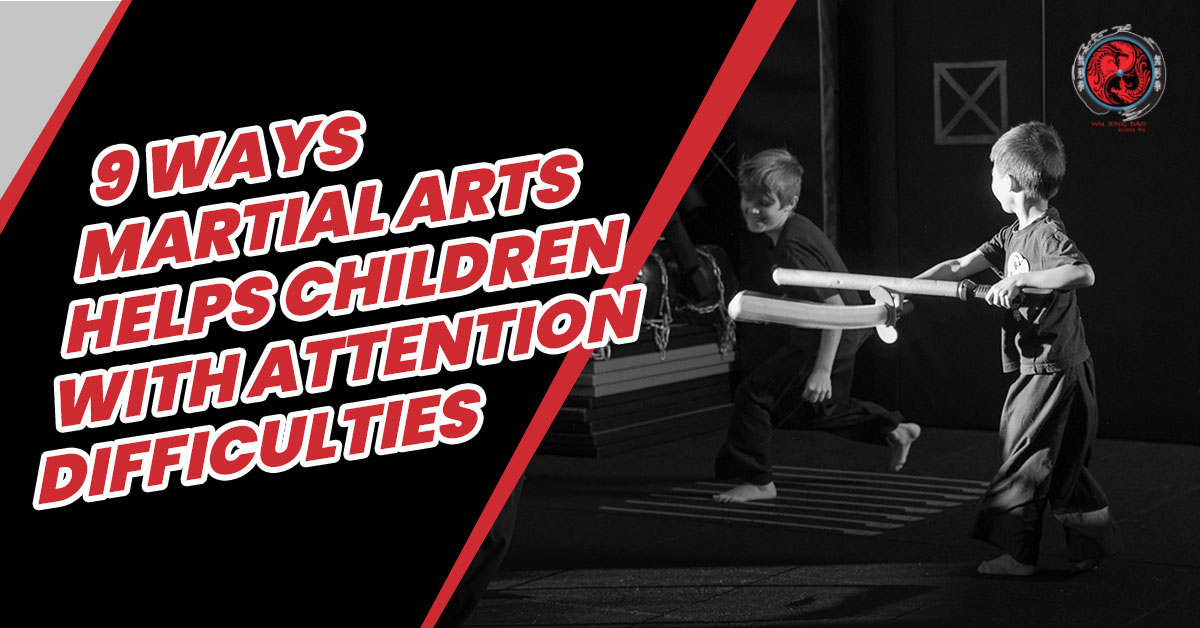Martial arts is more than just a physical activity; it’s a discipline that offers numerous benefits for children, especially those with attention difficulties. In a world where distractions abound, the structured environment of martial arts can provide essential tools to help children improve their focus, concentration, and overall well-being. According to recent studies, attention difficulties affect a significant portion of the child population.
This article explores how martial arts can positively impact children with attention difficulties by addressing ten key aspects.
1) Improved Focus and Concentration
Martial arts demand unwavering attention and concentration. Whether it’s executing a precise technique or reacting to an opponent’s move, children participating in martial arts learn to tune out distractions and sharpen their focus. This enhanced concentration can extend beyond the dojo, benefiting their academic performance and daily life tasks. The practice of mindfulness in martial arts can also help children stay present and attentive.
In martial arts, every move, every strike, and every defence requires a high level of concentration. Children with attention difficulties may initially struggle with this demand, but over time, they learn to harness their focus. This skill becomes invaluable not only in martial arts but also in their academic pursuits.
Martial arts instructors emphasise the importance of maintaining a clear mind during practice. This mental discipline carries over to other areas of life, where children with attention difficulties can apply their improved focus to homework, chores, and even social interactions. In essence, martial arts serve as a training ground for sharpening the mind’s focus and enhancing attention span.
2) Enhanced Self-Discipline
One of the core principles of martial arts is self-discipline. In a structured martial arts class, children learn to follow instructions, adhere to routines, and respect their instructors. This discipline carries over into their everyday lives, helping them stay on track with tasks and responsibilities. The consistent practice required in martial arts reinforces the importance of self-discipline as a valuable life skill.
Martial arts instil a sense of responsibility in children. They understand that they must attend classes regularly, practice diligently, and follow the dojo’s rules and etiquette. For children with attention difficulties, who may struggle with impulsivity and lack of structure, martial arts provide a framework that promotes self-discipline.
Moreover, the goal-oriented nature of martial arts, where students work towards achieving higher belts, further encourages self-discipline. Children learn that progress requires dedication and that patience is essential to mastering new techniques. These lessons translate into improved behaviour and self-control in various aspects of their lives.
3) Stress Reduction and Emotional Regulation
Children with attention difficulties often grapple with heightened stress levels and challenges in regulating their emotions. Martial arts offers a unique avenue for addressing these issues. The physicality of martial arts provides an outlet for pent-up energy and emotions.
The rigorous training sessions in martial arts help children release built-up tension and reduce stress. The endorphins released during physical activity contribute to improved mood and overall well-being. It’s not uncommon to see children with attention difficulties experience a sense of calm and relaxation after a martial arts class.
Additionally, martial arts places a significant emphasis on controlled breathing and mindfulness. These practices help children become more aware of their emotions and develop strategies for managing them. By learning to control their breath during intense training, they can transfer this skill to real-life situations, helping them regulate their emotions effectively.
4) Increased Physical Fitness
Martial arts training is physically demanding, requiring strength, flexibility, and stamina. Engaging in regular physical activity through martial arts not only improves overall fitness but also has a positive impact on attention and behaviour. Children with attention difficulties may find it easier to concentrate after expending energy during martial arts practice. This improved physical fitness contributes to their overall well-being.
Martial arts workouts encompass a combination of cardiovascular exercise, strength training, and flexibility drills. These physical components help children develop their bodies while honing their mental focus. As they engage in rigorous training routines, they become more physically fit and capable.
Incorporating regular exercise into their routine can lead to better sleep patterns for children with attention difficulties. Quality sleep is crucial for attention and cognitive function. By participating in martial arts, they not only improve their physical health but also enhance their sleep quality, which, in turn, positively impacts their attention span and overall behaviour.
5) Improved Coordination and Motor Skills
Martial arts involve precise and coordinated movements, which are essential for success in various techniques. Through practice, children develop better coordination and fine-tune their motor skills. These physical improvements extend to their daily activities, making tasks that require fine and gross motor skills more manageable.
The martial arts curriculum typically includes various forms and kata, which are sequences of precise movements. These forms require students to execute techniques with precision and grace. As children practise these forms, they enhance their coordination, balance, and spatial awareness.
Improved motor skills play a crucial role in a child’s development. They contribute to better handwriting, improved hand-eye coordination, and the ability to perform everyday tasks with ease. For children with attention difficulties, who may struggle with fine motor tasks, martial arts can provide valuable training to enhance their physical abilities.
6) Building Self-Confidence
Achieving milestones in martial arts, such as earning belts or mastering techniques, boosts a child’s self-esteem and self-confidence. For children with attention difficulties, who may face challenges in other areas, martial arts can provide a sense of accomplishment. This increased self-confidence can lead to greater motivation, improved attention, and a more positive self-image.
Martial arts classes provide a structured environment where children can set goals and work towards achieving them. As they progress through the ranks, they gain a sense of accomplishment with each new belt they earn. This sense of achievement fosters self-confidence and a belief in their capabilities.
Furthermore, martial arts instructors often reinforce positive behaviours and attitudes. They offer praise and encouragement for hard work and dedication, reinforcing the idea that effort leads to success. This positive reinforcement contributes to children’s self-esteem and encourages them to stay focused and committed to their goals.
7) Learning Respect and Patience
Respect is a fundamental aspect of martial arts. Children learn to respect their instructors, peers, and the principles of the martial art itself. Moreover, martial arts emphasise patience as students progress through various levels and techniques. These values of respect and patience translate into better behaviour and interactions in other aspects of a child’s life.
In the martial arts dojo, respect is not optional; it’s a fundamental requirement. Children are taught to bow to their instructors, treat their peers with courtesy, and follow the dojo’s code of conduct. This environment instils in them the importance of respecting authority figures and their peers.
Learning patience is an integral part of a child’s martial arts journey. Progression in martial arts takes time and consistent effort. Children with attention difficulties often seek instant gratification, but martial arts teaches them that mastering new techniques requires patience and practice. This lesson extends beyond the dojo, helping them become more patient in everyday situations.
8) Social Interaction and Teamwork
While martial arts training is an individual journey, it often takes place within a group setting. Children interact with peers and work together to achieve common goals. This fosters social skills, cooperation, and a sense of belonging. For children with attention difficulties, who may struggle with social interactions, martial arts can provide a supportive environment for improving their social skills.
Martial arts classes bring together children from diverse backgrounds and experiences. They practise alongside one another, forming bonds and friendships. This social interaction helps children develop essential social skills, such as effective communication and conflict resolution.
Teamwork is a crucial aspect of martial arts training, especially in partner drills and sparring. Children learn to collaborate with others, adapt to different styles, and support their training partners. These teamwork skills are valuable not only in martial arts but also in school group projects and other cooperative activities.
9) Setting and Achieving Goals
Martial arts involve goal-setting at every level, from earning belts to mastering specific techniques. Children learn the value of setting objectives and working persistently to achieve them. This goal-oriented mindset can transfer to their schoolwork and other activities, motivating them to stay focused and achieve their academic and personal goals.
The belt system in martial arts provides a clear framework for goal-setting. Children begin with a white belt and work their way up through various coloured belts, each representing a different level of expertise. This progression encourages them to set specific goals for advancing in rank.
Setting and achieving goals in martial arts instil a sense of accomplishment and motivation. Children learn that with dedication and effort, they can overcome challenges and reach their objectives. This mindset extends to other areas of life, where they become more proactive in pursuing their academic and personal goals.
Final Thoughts
Martial arts offers a holistic approach to addressing attention difficulties in children. From improving focus and concentration to enhancing self-discipline and self-confidence, the benefits of martial arts are numerous. It provides a structured, supportive environment where children can develop essential life skills while nurturing their physical and mental well-being.
Parents and guardians seeking effective strategies to help children with attention difficulties should consider martial arts as a complementary activity that can have a lasting positive impact on their child’s life.
The combination of physical activity, mental discipline, and social interaction makes martial arts a valuable tool in helping children thrive despite attention challenges. By enrolling children in martial arts classes, parents are not only investing in their physical fitness but also equipping them with essential life skills that will serve them well throughout their lives.
Hotwire Your Health!
If you have a child with learning difficulties, consider exploring the world of Martial Arts. At Wu Xing Dao Kung Fu, we believe in a comprehensive approach to Martial Arts that encompasses not only self-defence and physical techniques but also self-discipline, health and nutrition.
Upon joining our martial arts classes, we provide guidance on the different martial arts styles available and the associated life skills. This enables you to make an informed decision about which style to pursue. Our program ensures that all students are proficient in self-defence while also reaping the numerous health benefits of practising martial arts.
Please call us today on 0410 249 217 or leave a message and we’ll get back to you ASAP.


